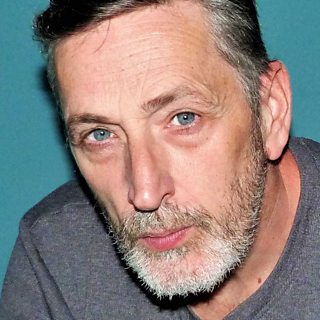-
Series 2 of The Responder comes to ����ý One and ����ý iPlayer from Sunday 5th May at 9pm. Catch up with Series 1 now on ����ý iPlayer
Was the writing process different for you when you were creating Series 2 of The Responder?
Do you know what? It wasn’t. I was expecting it to be, and everyone talks about the difficult second album syndrome, but I think I’m just too stupid to get stressed about it! So it was literally just ‘Do It Again’ – I went into a room and did it again.
Do you have a favourite scene or moment across the two series?
I always say this, and people must be sick of listening to it, but it’s still by far and away my favourite scene, which is in episode 1. It’s Chris (Martin Freeman) and Marco (Josh Finan) in the police car driving along.
One, I love it because it’s beautifully shot. It’s in the dark. It sums up what being a copper is so much about which is you and the person you’ve arrested or the person you’re with and that small fish-tank environment. I love that and I love that they captured that so beautifully, the director . It was the first scene that I wrote and it was me talking to me. I wrote it as an exercise which was me being a copper later in life and me being a scally earlier in life sitting in the back of a car. So it’s very much a conversation between me and me. It’s by far and away my favourite scene.
Were there any new themes that you wanted to explore or existing ones that you wanted to build on with Series 2?
The themes that I wanted to explore and expand upon that were important to me were relationships and love. I think every show – literally every show from right the way up to something like is about love and relationships. It’s the whole thing for me. The Responder is not a crime show, it’s a show about those issues.
For me, being a father of a two-and-a-half-year-old I was really interested in Chris’s struggle with being a good Dad and holding that in relation to his struggle with how his own Dad wasn’t a good Dad. It’s about his fears about that and his fears about carrying that mark on him. He’s terrified that he’s going to pass those bad things onto his daughter. Those were the themes that I really wanted to look at – fatherhood, love and relationships. To me those are the most important things.
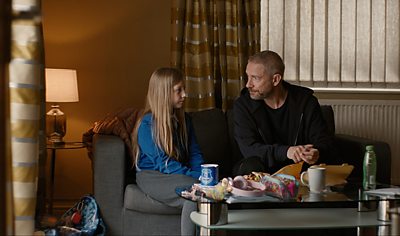
What do you think made The Responder resonate with people?
I’m still coming to terms with the fact that it did resonate with people! It resonated all around the world. I’m still getting stopped by people who want to talk about series one. It kind of caught fire and took off. I think because everyone was expecting it to be one thing and it turned out that it wasn’t.
Everyone thought it was going to be Line of Duty (and I love Line of Duty) but it’s not Line of Duty. And everyone thought if it wasn’t that then it would be something like from years ago, and it wasn’t that either. It’s just a programme about people and I think people are interested in people, so it can only be that.
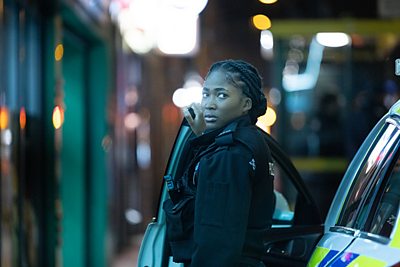
How important is Liverpool as the setting and what does that bring to the story?
It was massively important to me, if only because the way that I wrote it was very much using the rhythms of speech and the people. The people in the show are almost real, well they are real to me, but they’re almost real. I’ve literally just been chatting to someone who could have been in the show. It was very important to me that I got those people in the show and also I love this city, it means a lot to me. It’s nice to do something in your hometown. I think as well, it gives it an identity that maybe it wouldn’t have had if it was set in, I don’t know… Hemel Hempstead. I might write that show next!
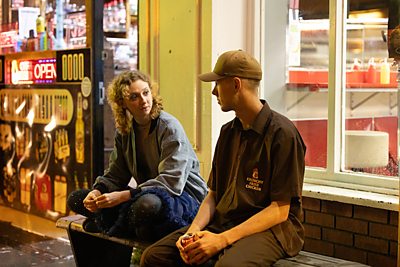
What is it about police dramas that makes them so rich for storytelling?
When I was a copper, very very early on in my career a bobby said to me that we’re never going to knock on someone’s door and tell them they’ve won the lottery. You are only ever dealing with strong emotions and dark emotions. It’s very rare that you just have a bland, boring day. Everything is always very heightened.
The minute that you heighten life then any kind of drama that you’re writing about it is exaggerated again and heightened further. It’s just fertile ground for plucking stories out (do you pluck things out of fertile ground?) It’s perfect for it. Big emotions – that’s what you want in a drama.

How did your writing journey start?
A very long time ago… it’s like ‘Once Upon a Time Tony wanted to be a writer…’ When I was a kid, I really wanted to be a writer and used to love writing stories at school. The only class I was interested in was English, that was all I wanted to do. But I failed my English exam and I thought that was it, “Oh well, never going to be a writer”.
Thirty-odd years later I’m driving a cab after having a nervous breakdown and quitting the police and a lady got in the cab and said to me that she was the editor of a magazine. I said to her "I’m a writer". I don’t know why I said it, but I just said it. Now I look back and I think that I wasn’t lying really, I’d always been a writer but just hadn’t written anything. Hopefully that’s been born out after three novels and The Responder.
She told me to send her some stuff, so I had to go away and start writing again. It was like someone just took the finger out of the dam and suddenly all this stuff flowed out of me. I was a writer, there was a thirty-year hiatus and then suddenly I was a writer again. I think I’m almost qualified to say now that’s what I am.
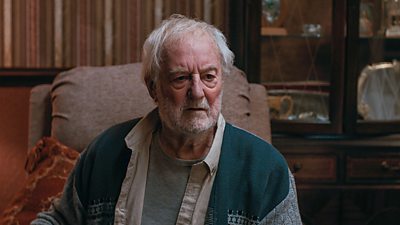
How important is life experience to your writing?
I think for me it’s very important. For my writing it’s very important. But I do sort of take umbrage with people when they say “ah well you’ve got all that life experience, someone who is twenty-one hasn’t got that life experience”. But they’ve probably just got a better imagination that I have. I don’t think life experience is important for everyone. I don’t believe in write what you know, I believe in write what you can imagine. I think people should just enjoy writing. You shouldn’t wait to start writing.
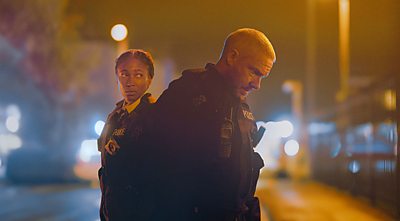
How do you create compelling characters?
I don’t know! I hope I just do it. I think what I do is not just to write a scene between two people. I’ve got one person here and one person there and information is passing between them – what should a scene do? Pass information. When I’ve written that scene I’ll come round behind this character, and I’ll try and move into their head – this is what I’m doing at three in the morning! I’ll move into their head, and I’ll look at the other character through their eyes.
So, I’ve got all the information but when I run that scene again in my head I’m trying to see if there’s anything between them that I can use and build on. It might be their appearance – “look at the state of you, where have you been?’’. It’s a bit of human language. When I’ve done that, I’ll come round the other side and look through the other character’s eyes.
Your scene has got to convey information. If it’s not conveying information, then it shouldn’t be there – that’s what people would say. They’re probably right but I don’t necessarily think that’s true. I think there’s always space for a scene where you don’t have to convey as much information in what people say. Sometimes no words are better than a lot of words. People think to make a compelling character that they’ve got to say a lot.
Chris Carson (Martin Freeman) in the show doesn’t really say that much. He doesn’t pass that much information on. Sometimes the compelling nature of the character is in the silence as well and what they’re doing with their hands, or where they’re sitting or what they’re looking at. Get in their head, get behind their eyes and look at the world through their eyes.
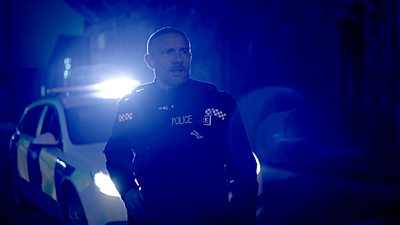
Any top tips?
There’s one that I wish I had known which is – Don’t get in your own way. I keep saying this over and over. The one thing that stops writers more than any others is themselves. Get out of your way. Start writing. We talk about self-doubt and block and confidence. It’s all you. You’ve just got to write it. Don’t think that you’ve got to buy a new notepad. I’m guilty of all of this, I’ve got about twenty brand new notepads on my desk, I’m guilty of it and that’s why I can speak with a degree of confidence. Stop telling yourself things like ‘I don’t know how to format a script’, just write it. It doesn’t matter if the format is wrong, or you haven’t got the software.
Jimmy McGovern – well if you’re going to get writing advice go to the boss! Jimmy said to me “Write you”. At the time I thought he meant just write my story but as time has gone on, I think what he was saying was to write what you feel is right, don’t write what you think will be a hit or that people are looking for. Don’t try and tailor your work to the current crop of television shows or films. Be you, you’re individual and unique.
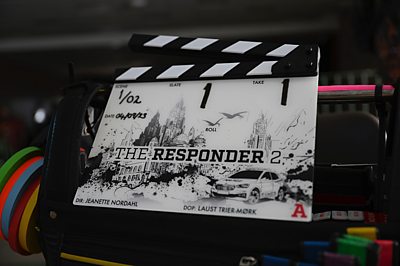
What are the benefits of writer development schemes?
The experience – it’s just that. I was part of the ����ý Writersroom North group (Voices). You have people coming in to speak to the group who I would never in a million years get the opportunity to listen to. People would come in and talk about commissioning and theatre and radio. It’s also a calling-card if you can get onto those schemes it’s a way of other people getting to know you.
One of the first people I met at a ����ý Writers event was at Stratford in East London (at the writers’ festival). It’s a bit of a hike from Liverpool. I met Helen Black who went on to write Time series 2 with Jimmy McGovern. When I met Helen neither of us had written anything for television but we’re still mates and hoping to collaborate together one day. I’m Britain’s worst networker so it was Helen who came over and put me in a headlock and started talking to me! If you find it difficult to network, just go anyway, you’ll learn stuff, why would you not want to learn stuff?
-
Series 2 of The Responder comes to ����ý One and ����ý iPlayer from Sunday 5th May at 9pm. Catch up with Series 1 now on ����ý iPlayer
